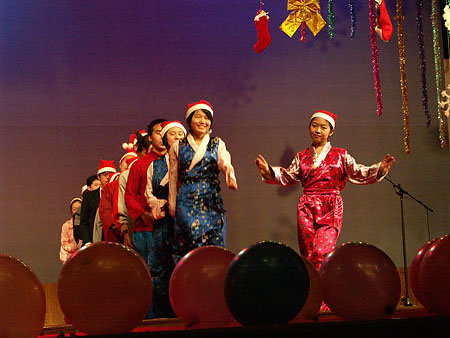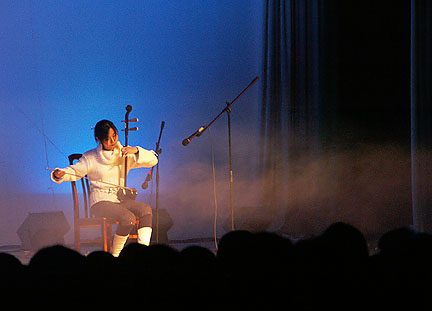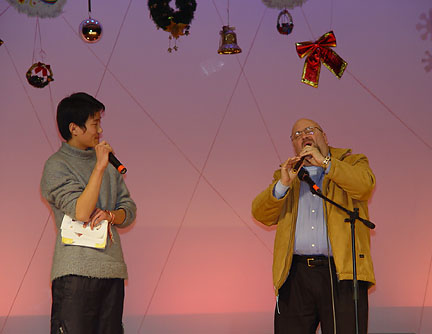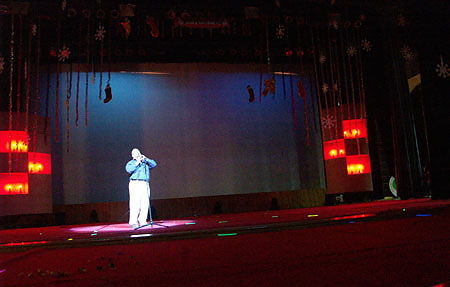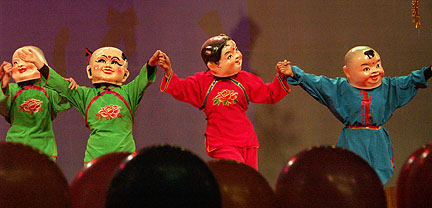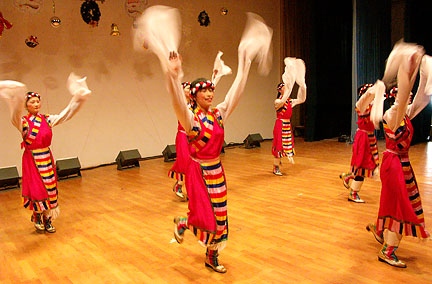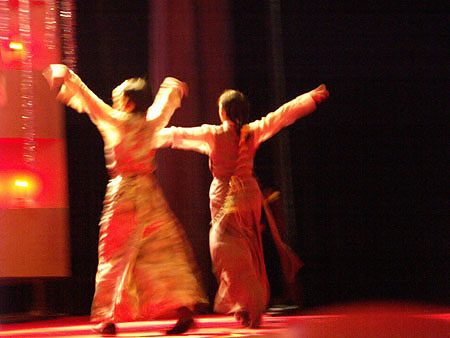The Road to
China
Chapter
16:
Christmas in
Beijing
"mumble
mumble.. mumble mumble... FA LA LA LA, LA
LA LA LA!"
- The students at #80
high school, who were learning to sing traditional Christmas songs
for the first time.
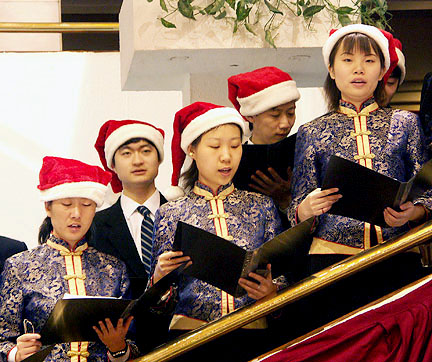 Dr. Bob Loren posted a small,
handmade flyer on a bulletin board at Number 80 High School, which
read: "There will be a Christmas Concert held this December.
All those wishing to participate please sign your name
below." That was last September. If this had been an
American school, perhaps a dozen people might have
volunteered. Here, eight hundred students (90% of the
Senior class) signed up the first week.
Dr. Bob Loren posted a small,
handmade flyer on a bulletin board at Number 80 High School, which
read: "There will be a Christmas Concert held this December.
All those wishing to participate please sign your name
below." That was last September. If this had been an
American school, perhaps a dozen people might have
volunteered. Here, eight hundred students (90% of the
Senior class) signed up the first week.
Welcome to Christmas in
Beijing!
The strange thing is, twenty
years ago few people in China even knew what Christmas was (and
those who did know associated it with the heresy committed
by those capitalist pigs and imperialist dogs). Yet today it
seems everyone has now enthusiastically embraced this happy Western
tradition. Signs of Christmas are everywhere - all store
clerks and restaurant workers are wearing Santa hats, there are
Nordic-looking Santa Claus images in all storefront windows, hotel
lobbies are filled with carolers, lights and trees are everywhere,
windows have icons emblazoned upon them with temporary spray-paint,
and everyone (EVERYONE!) is wishing me a Merry Christmas in
English.
Does this mean the Christian
missionaries have finally achieved their goal they've been
steadfastly pursuing since the early 7th century A.D.? Alas,
no; it seems that Christmas is viewed not as a religious holiday,
but rather as a wonderful western cultural (and economic!)
tradition. (Hmmm... upon reflection that's how most Americans
see it too. :-) ). But there are a few twists. For
example, in China, one must eat an apple on Christmas Eve to ensure
good luck for the coming year.
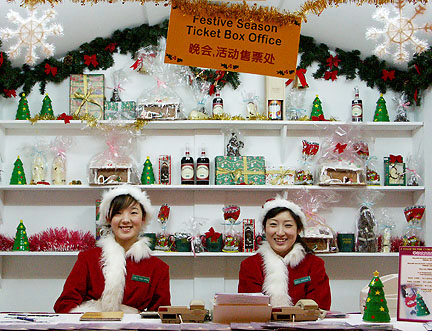 So what does a nice Jewish
boy like me do in the midst of all this goyisha mishagas?
Why, give in, of course! At each holiday concert I attended
(there were four in all), I was asked if I would play some
traditional Christmas songs on my Xaphoon, and of course I
obliged. (At one they wanted to include a token Jewish
song. I played Hava Nagila on the Xaphoon and taught about 20
students how to do the Hora.) This is the first time I ever
performed without a backup band, which is kind of scary because
from a showmanship point of view, just standing there and playing
The Twelve Days of Christmas in its entirety doesn't cut it
for entertainment. (Anyone who's ever been to a Gordon
Lightfoot concert will know what I'm talking about.) A good
show is engaging; it must involve the audience, reach them through
either a multitude of senses or by shared experience; hopefully
both.
So what does a nice Jewish
boy like me do in the midst of all this goyisha mishagas?
Why, give in, of course! At each holiday concert I attended
(there were four in all), I was asked if I would play some
traditional Christmas songs on my Xaphoon, and of course I
obliged. (At one they wanted to include a token Jewish
song. I played Hava Nagila on the Xaphoon and taught about 20
students how to do the Hora.) This is the first time I ever
performed without a backup band, which is kind of scary because
from a showmanship point of view, just standing there and playing
The Twelve Days of Christmas in its entirety doesn't cut it
for entertainment. (Anyone who's ever been to a Gordon
Lightfoot concert will know what I'm talking about.) A good
show is engaging; it must involve the audience, reach them through
either a multitude of senses or by shared experience; hopefully
both.
What to do? I used every
trick I knew. First I opened with an a cappella version of
God Rest Ye Merry Gentlemen, played as if I were a jazz alto
sax player in a subway. That showed off the instrument's
range of expression quite nicely. Then I had half the
audience clap their hands and the other half drone in "C" while I
did The Little Drummer Boy and then O Come All Ye
Faithful. I changed keys a lot. Finally I brought
my class onstage and we all led the audience singing two verses of
Jingle Bells (which everyone here knows, barely). That ate up
5 minutes, and since the average length of the Christmas
party/performance was about 4 1/2 hours, that was
plenty.
Because Christmas is not a
national holiday (businesses and schools are still open), my
schools were kind enough to give me two days of holiday on the 24th
and 25th. But then they insisted that I teach two additional
days to make up for the time off. Welcome to
China!
Mini-Gallery of Christmas
images
So How Religious Are They,
Anyway?
We have all heard about China's
rich history of philosophy and thought - from Confucianism to
Taoism, which was later "replaced" (judging by the populations of
adherents) by Buddhism and Christianity. And then nothing for
several decades after the Great Proletarian Cultural Revolution,
since religion represented an opportunity to organize and conspire,
and what insecure ruling party would allow that? Anyway, what
I'm trying to say is I have found very few religious people
here. (This is similar to the shocking revelation I had
during my first trip to Israel in 1978, when I learned that the
vast majority of its residents were not religious at all!)
"So what keeps people going?", I naively asked several Chinese
friends. "We are like flowers" came the explanation.
"We're here, and then we're gone."
Still wanting to learn more, I
went to the web to see what I could find about the current state of
religious practice, and as is typical of this kind of research, the
numbers and dates I found were all over the map. Here's an
average of the numbers I found, which at least gives an idea of the
relative proportions:
| Religion |
Est'd Number
Practicing |
| Buddhism |
16M |
| Catholicism |
4M |
| Protestantism |
10M |
| Islam |
4M - 18M
(!) |
| Jews |
(Ha!) |
| Falun
Gong |
100K - 15M
(?) |
One thing that all the sites
agreed upon: In a country with more than 1.2 Billion people, only
about 8-10% are being labeled as "practicing" religious
followers.
Meet the Students
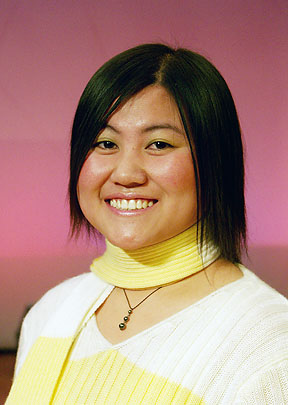
East,
West cultures together: "Ni Hao are you?"
[Editor's note: "Ni Hao" is the Chinese equivalent of
"Hello".]
By Fu Li
("Cilla")
My topic today is the east
and the west - can we live in two cultures?
Have you received a
birthday cake with candles from your friends or relatives? Have you
ever taken part in any parties or balls to celebrate Christmas? I'm
sure the answer would be positive. But, when and how did it happen
that our birthday noodles changed to birthday cakes? When did we
begin to send cards for Christmas? That involves the long process
of cultural interaction and cultural fusion.
Today, it is not hard to
see and feel the intrusion and spread of western life-style and
even western ideas that we no longer consider as foreign!
Traditionally speaking, the Chinese people like to get together for
family reunion to celebrate the Spring Festival. Yet nowadays, more
and more people prefer to enjoy the Festival by traveling across
the country. Hard-working and plain-living have always been a fine
Chinese tradition. We never exhaust our savings but to keep them in
the bank. Yet as a modern consumer's economy develops, isn't it
true that more and more people are shopping with credit cards and
not a few people are buying apartments or even houses on bank loans
-- something our grandparents have never heard of and are still
quite puzzled about? But on the other hand, Eastern culture has
also left its footprint on the Western ground. More and more
Westerners are studying Chinese, learning to practice shadow-boxing
or qi-gong; Sun-Tzu's The Art of Warfare and Lao Zi's 'Daode
Jing' have been listed as best recommended books on New York
Times Sunday Literary Supplement. So, the fact is, we are living at
a time when the East is meeting the West. We are living at a time
when two cultures are merging into each other. In this sense, we
are living in two cultures!
Cultural contact is useful
and beneficial. Each culture, each nation needs constant enrichment
by drawing on another culture. The famous Silk Road in history took
Chinese silk, porcelain, paper-making techniques, and probably also
noodles and fire crackers, to central Asia and Europe. It brought
in new arts and crafts from the West and enriched our culture.
Today, Western art, literature, movies, music, ballet, opera, dance
have made our cultural life more colorful and more diversified.
Western ideas and practices have opened new possibilities. Even the
so-called "spending before earning" way of life has a certain
element of validity and applicability in the current market economy
in China. Well planned and carefully managed within reasonable
limits, it will enable us to enjoy many things earlier and, at the
same time, boost the market and promote production. We should work
hard, and at the same time we deserve the material wealth we have
created or we are going to create!
Work hard and enjoy life.
This is part of the subtle change which has taken place in our
attitude towards life and it is not, as I see it, unrelated to the
recent influence of the Western concept of life.
My dear friends, as we are
marching into a new millennium, what used to be a vast world is now
fast becoming a global village. Mankind is marching into a new
millennium and it is becoming one large family. Let us all do our
best to contribute to this great historic process!
Epilogue
"I'll never work this hard for a
school again!" said Dr. Loren on the eve of the Christmas
Concert. Three months in the making, and just about
everything had gone wrong. The other teachers had planned
conflicting extra-curricular activities which prevented many of his
students from attending rehearsals. The Headmaster for Senior
2 commanded all of her students NOT to participate in the concert;
they should be spending their time studying instead. Of the
800 students who originally signed up only about 100 or so were
left to perform come December. The students who had
volunteered to accompany on the piano didn't know the pieces well
enough, so I had to pinch-hit on the piano and
Xaphoon.
In other words, it was a
standard school Christmas show, complete with chaos, randomness,
and a lot of entropy. All things considered, it went pretty
well.
But Bob felt that he was not
being appreciated; that the school has been sabotaging every
positive thing he's tried to do for the students. Adding
insult to injury, the school also told him that they would not /
could not sponsor him for his Visa to stay in China. Then the
administration cut his semester short by two weeks without telling
him (a common event in China). "That's it!", he said.
"This is my last semester here!"
The students were completely
unaware of his decision to leave, of course, until the last few
minutes of the Christmas Concert, where the school administrators
got on stage and made a big to-do about how much Bob is
appreciated. After a 15-minute presentation which included
flowers, chocolates, Chinese windchimes, and several spontaneous
"We love you Bob!"s from the student audience, things got just a
little emotional. Both the students and Bob started crying,
and all tried to hide it. I know students are often fond of
their foreign teachers, but I felt this went beyond the standard
feel-good going away facade I've seen so many times in the
past. Everyone there truly loved him, his energy, and the
spirit he brought to the school. Bob had left an
indelible impression on the school's inaugural semester. He
will be missed.
Almost immediately after Bob
started packing and moving things out of his dorm, I was approached
by the school's vice principal, asking if I wanted Bob's job next
semester. (Hmmm... they didn't even wait for the body to get
cold! :-) ) I had to politely turn him down, as I've
had to turn down about 4 other attractive offers at various other
schools. Although I could easily stay in China and make a
nice life for myself, it is getting close for the time for me to
return home.
Until next
time...
"Yours Truly, Gary
Friedman"
December 30,
2003
Next Page - Chapter 17
Previous Page - Chapter 15
Table of
Contents
Return to
The Friedman Archives
Home Page
 Dr. Bob Loren posted a small,
handmade flyer on a bulletin board at Number 80 High School, which
read: "There will be a Christmas Concert held this December.
All those wishing to participate please sign your name
below." That was last September. If this had been an
American school, perhaps a dozen people might have
volunteered. Here, eight hundred students (90% of the
Senior class) signed up the first week.
Dr. Bob Loren posted a small,
handmade flyer on a bulletin board at Number 80 High School, which
read: "There will be a Christmas Concert held this December.
All those wishing to participate please sign your name
below." That was last September. If this had been an
American school, perhaps a dozen people might have
volunteered. Here, eight hundred students (90% of the
Senior class) signed up the first week. So what does a nice Jewish
boy like me do in the midst of all this goyisha mishagas?
Why, give in, of course! At each holiday concert I attended
(there were four in all), I was asked if I would play some
traditional Christmas songs on my Xaphoon, and of course I
obliged. (At one they wanted to include a token Jewish
song. I played Hava Nagila on the Xaphoon and taught about 20
students how to do the Hora.) This is the first time I ever
performed without a backup band, which is kind of scary because
from a showmanship point of view, just standing there and playing
The Twelve Days of Christmas in its entirety doesn't cut it
for entertainment. (Anyone who's ever been to a Gordon
Lightfoot concert will know what I'm talking about.) A good
show is engaging; it must involve the audience, reach them through
either a multitude of senses or by shared experience; hopefully
both.
So what does a nice Jewish
boy like me do in the midst of all this goyisha mishagas?
Why, give in, of course! At each holiday concert I attended
(there were four in all), I was asked if I would play some
traditional Christmas songs on my Xaphoon, and of course I
obliged. (At one they wanted to include a token Jewish
song. I played Hava Nagila on the Xaphoon and taught about 20
students how to do the Hora.) This is the first time I ever
performed without a backup band, which is kind of scary because
from a showmanship point of view, just standing there and playing
The Twelve Days of Christmas in its entirety doesn't cut it
for entertainment. (Anyone who's ever been to a Gordon
Lightfoot concert will know what I'm talking about.) A good
show is engaging; it must involve the audience, reach them through
either a multitude of senses or by shared experience; hopefully
both. 